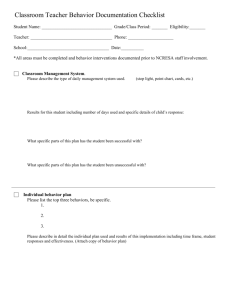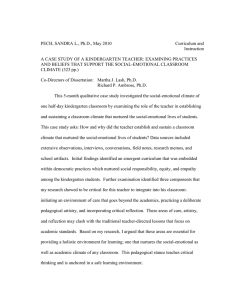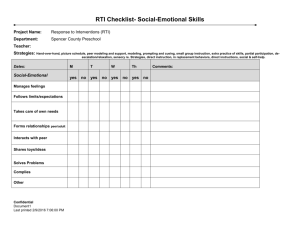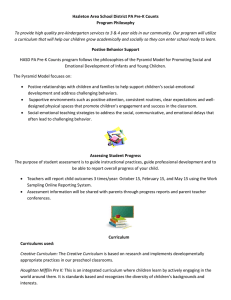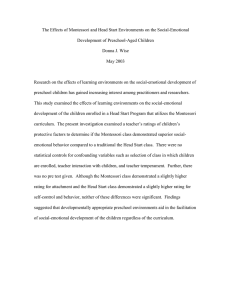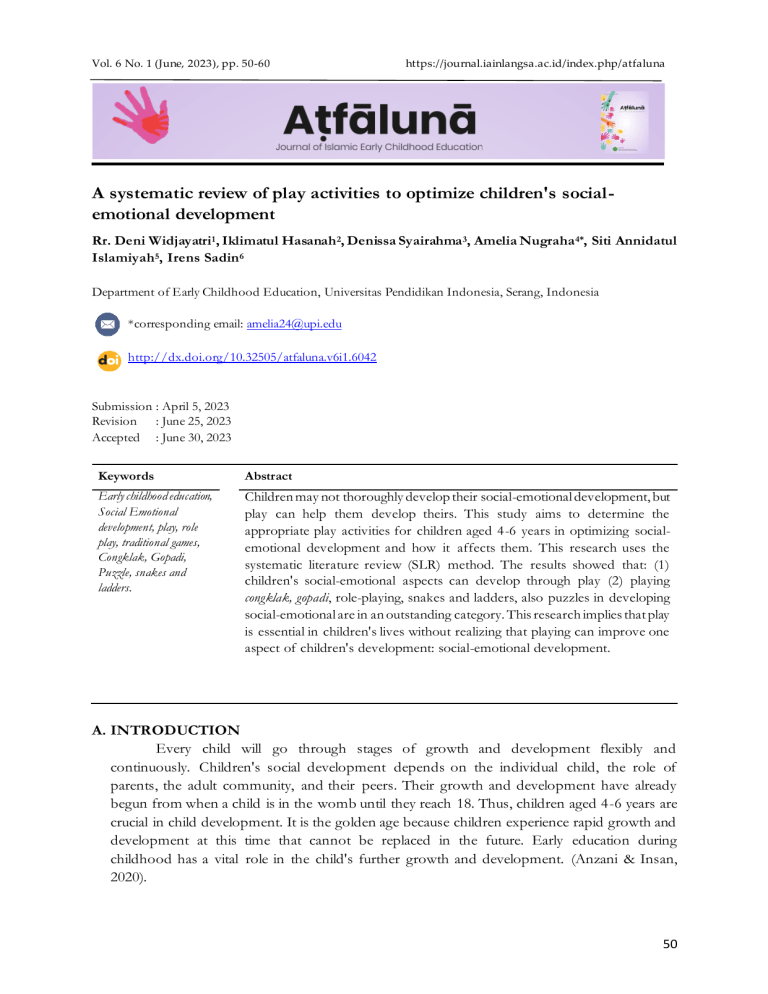
Vol. 6 No. 1 (June, 2023), pp. 50-60 https://journal.iainlangsa.ac.id/index.php/atfaluna A systematic review of play activities to optimize children's socialemotional development Rr. Deni Widjayatri1 , Iklimatul Hasanah 2, Denissa Syairahma 3, Amelia Nugraha 4*, Siti Annidatul Islamiyah5, Irens Sadin 6 Department of Early Childhood Education, Universitas Pendidikan Indonesia, Serang, Indonesia *corresponding email: amelia24@upi.edu http://dx.doi.org/10.32505/atfaluna.v6i1.6042 Submission : April 5, 2023 Revision : June 25, 2023 Accepted : June 30, 2023 Keywords Abstract Early childhood education, Social Emotional development, play, role play, traditional games, Congklak, Gopadi, Puzzle, snakes and ladders. Children may not thoroughly develop their social-emotional development, but play can help them develop theirs. This study aims to determine the appropriate play activities for children aged 4-6 years in optimizing socialemotional development and how it affects them. This research uses the systematic literature review (SLR) method. The results showed that: (1) children's social-emotional aspects can develop through play (2) playing congklak, gopadi, role-playing, snakes and ladders, also puzzles in developing social-emotional are in an outstanding category. This research implies that play is essential in children's lives without realizing that playing can improve one aspect of children's development: social-emotional development. A. INTRODUCTION Every child will go through stages of growth and development flexibly and continuously. Children's social development depends on the individual child, the role of parents, the adult community, and their peers. Their growth and development have already begun from when a child is in the womb until they reach 18. Thus, children aged 4-6 years are crucial in child development. It is the golden age because children experience rapid growth and development at this time that cannot be replaced in the future. Early education during childhood has a vital role in the child's further growth and development. (Anzani & Insan, 2020). 50 Rr. Deni Widjayatri, Iklimatul Hasanah, Denissa Syairahma, Amelia Nugraha, Siti Annidatul Islamiyah, Irens Sadin A systematic review of play activities to optimize children's social-emotional development. According to the 2003 National Education System Law, early childhood is children aged 0-6 years and between 0-8 years. During this period, children experience rapid growth and development that will not be replaced in the future, so this period is referred to as the golden age (Depsiknas, 2003). This golden age period is very influential on the next stage of growth and development. This period also only lasts once in the lifetime of each individual (Trianto, 2011). herefore, the process of growth and development at this time must be very concerning to teachers and parents. Of course, parents expect their children to develop according to their age. One of the aspects that a child must have been social-emotional development. Although "social" and "emotional" have different connotations, these social and emotional aspects cannot be separated. It is because there is a relationship between the two aspects (Damayanti & Nasrul, 2020). Children's social development starts from the time they are infants, according to the development of their bodies, infants who have become children and then become adults will get to know their wider environment, about acquaintance with other people starting with getting to know their mothers, then getting to know their fathers and families. In addition, as human acquaintances become increasingly hybridized, they can adapt to a broader population. Ultimately, humans get to know life together, then society or state in social life. In the development, the child (human) finally knows that humans help, give, and get each other. In addition, social development is the attainment of maturity in social relationships. Social development can also be described as learning how to follow what happens to the rules, ethics, and customs of the group—becoming a unit, communicating with each other, and working together. However, not all preschool children develop social-emotional maturity. It can be due to a variety of factors, including both internal and external factors. Children who cannot develop their social-emotional skills will have goals or engage in activities that conflict with their parents or others. They will also believe that what they do or imagine is terrible, which will cause them to feel guilty and ultimately cause them to lack confidence when joining groups. Children's lack of recognition can cause problems for their families and society. According to the Regulation of the Minister of National Education number 58 of 2009 concerning early childhood education standards, aspects of social-emotional development of children aged 4-6 years include being cooperative with friends, showing tolerant behavior, expressing emotions according to the conditions contained, recognizing manners and manners that are in harmony with local cultural values, understanding rules and manners, and sharing empathy (Depdiknas, 2009). According to Andiya (2023), as children grow up, so many failures in controlling emotions in children impact the surrounding environment and socializing ethics. Of course, this has caught people's attention from all groups, including the government. The government, in this case, tries to take part in this problem; this is implemented by the issuance of government provisions in Law No. 20 of 2003 concerning early childhood education aims to provide educational stimulation to help the growth and development of children from an early age so that they can support the development of their potential so that they are ready to enter the next level. It is important to note that socializing activities should be based on the child's age and developmental milestones (Harianti, 2016). It highlights the importance of social-emotional development in children. Furthermore, social development is the ability to behave following Aṭfālunā: Journal of Islamic Early Childhood Education. Volume 6 Issue 1, June 2023, p. 51 Rr. Deni Widjayatri, Iklimatul Hasanah, Denissa Syairahma, Amelia Nugraha, Siti Annidatul Islamiyah, Irens Sadin A systematic review of play activities to optimize children's social-emotional development. social demands. Meanwhile, emotional development is the feelings experienced by individuals, both positive and negative, that arise from responses to circumstances due to one's relationship with others or a group (Harianti, 2016). Social-emotional development, according to the American Academy of Pediatrics (2012) (in Nurmalitasari, 2015), is the ability of children to know about, manage, and express emotions completely, both positive and negative emotions, being able to interact with other children or adults around them, and actively learning by exploring the environment. Social-emotional development is learning to adjust to understand the circumstances and feelings when interacting with people in the environment, including parents, siblings, and peers, in everyday life. Socialemotional learning involves listening, observing, and imitating what they see (Erikson, 2010). Early childhood social-emotional development revolves around the socialization process (Yang et al., 2019). When children learn about the values and behaviors they receive from society, there are three goals of social-emotional development during this period. Firstly, achieving self-understanding (sense of self) and relating to others. Second, taking responsib ility for oneself includes following the rules and routines, respecting others, and taking the initiative. They were third, displaying social behaviors such as empathy, sharing, and queuing orderly. Social-emotional development is closely related to interaction with others or other objects. If the interaction is not good, the child's growth and development will not be optimal. However, most parents pay less attention to this in children, even though each child's social-emotional development is different. In this case, the role of educators is needed to understand the socialemotional development of children so that they can develop their abilities properly; one of the stimulations that can be done is by playing activities (Fitriani, R., & Adawiyah, 2021). Play is one way to help children, especially those between the ages of 4 and 6, develop their essential social and emotional skills. Play is an experience for children that must be experienced. Through play, children can create experiences; there is no need to forbid children from playing. Let them engage in fun activities independently without being hindered by parental restrictions. Although childhood is a time for play, parents often forbid their children to play because it wastes time. Parents limit their children's time playing and force them to spend their time studying. Children's potential intelligence will be developed through play. Play is an essential developmental stage that should always be taught to children. In addition to giving them a sense of fun, it also teaches them social and emotional skills. Play requires time, supervision, and ideas to make it fun for children. In a game, children will have social interactions, express themselves, be confident, and foster a sense of empathy. Several researchers have conducted research on the effect of play on children's socialemotional development, including Nurhayati (2021) on early childhood play and games. There is also research to train emotional regulation in preschool children by p laying (Sari, 2022). In addition, the analysis of early childhood social-emotional development has also been researched in traditional games (Mukhlis & Mbelo, 2019), snakes and ladders clogs (Fitriani, R., & Adawiyah, 2021), and congklak (Harbiyah & Lukmanulhakim, 2022). Therefore, researchers want to examine a systematic literature review (SLR) to determine the appropriate play activities for children aged 4-6 years in optimizing social-emotional development and how it affects this development. Aṭfālunā: Journal of Islamic Early Childhood Education. Volume 6 Issue 1, June 2023, p. 52 Rr. Deni Widjayatri, Iklimatul Hasanah, Denissa Syairahma, Amelia Nugraha, Siti Annidatul Islamiyah, Irens Sadin A systematic review of play activities to optimize children's social-emotional development. B. METHOD The method used in this research is Systematic Literature Review (SLR). Using this method, researchers can obtain valid and accountable information and data that are then used as references to create scientific papers. The systematic literature review (SLR) method was used in this study to identify, evaluate, and review all relevant research to answer a research question. This research emphasizes library searches utilizing library sources to obtain research data. This research limits its activities to library collection materials without needing field research. Formulating research questions, conducting a literature search to see what others have written about this topic, five articles are being the literature that will be used in the research, after reading and studying the articles, then recording some data about what is needed are some of the stages of this research. In this study, the researcher used scientific databases to obtain relevant sources related to the specific problem of "Games for Social-emotional Development of 4-6 Year Olds". The stages undertaken in this research are: Firstly, identifying questions about what games can help social-emotional development in children. Second, conducting a literature study search on the google scholar database using the Microsoft Edge application with the keyword for the search "Games to Develop Social-emotional AUD age 4-6 Years" by looking at the period of the article from 2019 to 2022 getting related data according to the keywords as many as five articles. Furthermore, the information was analyzed by conducting literature to collect information from the results of the literature. Then the articles, especially in the research results section, were intensively examined and reviewed. The data sources used in this research are secondary sources of the required data. Researchers have several search criteria as follows: a. Indonesian and English b. They were published between 2019-2022 c. Available in full-text d. Available in qualitative studies and quantitative studies. After applying the search based on the established criteria, the retrieved articles were evaluated for relevant studies that met the criteria requirements. The technique used in this research is the content analysis technique. According to Krippendorff, content analysis is a research technique to draw replicative and valid conclusions from data based on context. Content analysis is also a method for collecting and analyzing the content of a text. By carrying out a content analysis approach, qualitative information is used. In doing content analysis, several steps need to be taken by the author to obtain research results, namely formulating research problems, conducting literature studies, determining observation units and units of analysis, determining samples, determining variables, making categorization and coding guidelines, collecting data, coding data, processing data, presenting data and providing interpretations, and finally compiling research reports. C. RESULT AND DISCUSSION Games have many benefits for children. Apart from not spending much money, another benefit of games is that they can develop children's social-emotional behavior. Here are some studies related to games that can develop social-emotional development, including: Aṭfālunā: Journal of Islamic Early Childhood Education. Volume 6 Issue 1, June 2023, p. 53 Rr. Deni Widjayatri, Iklimatul Hasanah, Denissa Syairahma, Amelia Nugraha, Siti Annidatul Islamiyah, Irens Sadin A systematic review of play activities to optimize children's social-emotional development. Table 1. Research on games to develop children's social-emotional behavior Researcher and Year (Ganjar & Nine dwi. 2019) Type of Game Snakes and Ladders (Rukmini, 2022) Congklak (widyawati 2023) Gopadi (Renti maysaroh, 2019) Role Play (Mimpira haryanto, 2023) Puzzle Title of Article Research Results The effect of snakes and ladders game on social development of 4-6 year old children The study showed that snakes and ladders games affected children aged four years. Previously 45 children had not developed (100%) after being given in the snakes and ladders game, 66.7% of 30 children had highly developed social development, and 11 had under expectations. Effectiveness of congklak This study showed a change in socialgame for children aged 4- emotional development before and after 6 years on socialthe game of congklak. The average score emotional development of children before the treatment was 19.42, with the lowest score of 29 and the highest score of 55. Nevertheless, after the treatment, it showed a change in the average score to 27.6- while the lowest score was 31 and the highest was 55. The game of congklak impacts children's social and emotional development, according to the findings of this study. Teachers' efforts in The results showed differences in improving children's children's social-emotional skills scores social-emotional during the pre and post-test. The score development through the of social-emotional skills during the pretraditional game of gopadi test was 5.7, while the post-test result was at Melati Kindergarten, 10.09. Bima Regency, West Nusa Tenggara Teachers' efforts to Children's role play improves socialimprove children's social- emotional intelligence through cycle 1, emotional intelligence meeting 1; the first meeting showed that through role play at nurul 5% developed very well. Furthermore, huda kindergarten, Muaro cycle I meeting 2 was 30%. Furthermore, Jambi district in cycle two meeting 1, 50% developed very well; in cycle two meeting 2, the percentage of children was 85% developed very well. It can be concluded that social-emotional intelligence can be developed with the help of role-playing; this is evident from the research, which shows an increase in students' socialemotional development. Improving children's The research results were conducted social-emotional through two cycles of an average emotional development percentage in cycle one; only 56.75% through number puzzle have yet to reach the expected games for children aged development in cycle 2, an average of Aṭfālunā: Journal of Islamic Early Childhood Education. Volume 6 Issue 1, June 2023, p. 54 Rr. Deni Widjayatri, Iklimatul Hasanah, Denissa Syairahma, Amelia Nugraha, Siti Annidatul Islamiyah, Irens Sadin A systematic review of play activities to optimize children's social-emotional development. 4-5 years in Gemilang ECE, Bengkulu 97.2%; this figure shows the development that goes into the excellent category. Using number puzzle media in learning actions can improve skills to improve a child's social-emotional development. It can be seen from the data obtained through Cycle 1 and 2, which has increased gradually. Early childhood is an individual undergoing rapid growth and development and is even said to be a developmental leap because that early age is said to be the golden age, which is a valuable age compared to the next age. This age is a unique phase of life with distinctive characteristics, both physically, psychologically, socially, and morally). Early childhood development is a crucial, critical phase that significantly affects later life. A child between the ages of 4 and 6 is considered to be in the early childhood development stage. The child experiences rapid growth and development that will not be replaced in the future, so this period is called the golden age. This period also only lasts once in the lifetime of each individual. Therefore, the process of growth and development at this time must be highly considered by teachers and parents (Tursina, 2018). Early childhood is unique and experiences a rapid development in every aspect of development, leading to changes in development aspects. One of them is social-emotional development. Social development is the achievement of maturity in social relationships (Indanah & Yulisetyaningrum, 2019). Social development can also be interpreted as learning to follow the conditions of group customs, morals, and traditions. They are melting themselves as a unit and communicating and collaborating. Erikson (2010) hypothesis on individual and social improvement says that, during preschool, children must determine the character emergencies of guilt versus initiative. Erik Erikson, a psychologist, and psychoanalyst, broke down social-emotional development into eight stages. From infancy to 12 years, the first four years are associated with social and emotional development, and the next four years from 12 years to adulthood. Social-emotional development is the ability to develop social behavior, emotional control, relationships, and interactions based on feelings expressed toward others (Tusyana et al., 2019). Children's social-emotional development means the sensitivity of children to understand the feelings of others when interacting in everyday life. Children's ability to adapt to their environment and develop a sense of friendship that involves their feelings, thoughts, and actions is a hallmark of early childhood social-emotional development. In addition, the process by which children can develop their interpersonal skills by forming friendships and gaining a deeper understanding of the people in their immediate environment demonstrates children's social development because children are learning (Mayar, 2013). Children's social and emotional development are distinct characteristics that cannot be separated. In other words, children's social development and emotional growth must go hand in hand. The golden age of early childhood is when children become more receptive to various stimuli (Mukhlis & Mbelo, 2019). Children's social-emotional development is crucial, so a method is needed to develop children's social-emotional development, especially those aged 4-6 years, one of which is play. Aṭfālunā: Journal of Islamic Early Childhood Education. Volume 6 Issue 1, June 2023, p. 55 Rr. Deni Widjayatri, Iklimatul Hasanah, Denissa Syairahma, Amelia Nugraha, Siti Annidatul Islamiyah, Irens Sadin A systematic review of play activities to optimize children's social-emotional development. Play is an experience for children that must be passed. According to experts, children's world is often described as a world of play. Play. It is the ideal way to develop children's abilities. In addition, children learn a lot about themselves, others, and the environment through play. Play can help children develop social and emotional skills by directing their energy toward the activities they choose during playtime (Maysaroh, R., Magdalena, M., & Ulfah, 2019). Children can create experiences through play. Forbidding them to play is unnecessary. Let them engage in fun activities independently without being hindered by parental restrictions. Experts often assert that children's worlds are filled with play. By instilling a sense of privacy and teaching children the value of acting freely and independently, games designed with education in mind also help children develop their decision-making and creative thinking skills. Play is the ideal way to foster children's abilities (Harahap et al., 2022). Moreover, play teaches children a lot about themselves, others, and the environment. At playtime, children direct their energy to play movements of their choosing so that these actions invigorate their turn of events. Children are better prepared for their interactions with others through play (Khoiruddin, 2018). Children's egocentric thinking tendencies increase through play. Children can also organize themselves in order to play well with others. Children learn the importance of social work, friendship, the need to build relationships, and the need for the art of management and organization in relationships with others during playtime when the world is more expansive and opportunities for interaction are more frequent and varied (Ramadhan & Khadijah, 2018). The following games that can help children between the ages of 4-6 years develop socialemotional skills include: 1. Congklak The traditional game of Congklak has a board consisting of 14 small holes arranged lengthwise and facing each other. The Congklak board has two large holes at its right and left ends. There are 98 congklak seeds evenly spread across the 14 small holes, with seven seeds in each hole. Only two people can play the Congklak, consisting of seven small holes and one large hole, with each player facing the other. The first play of the game is who plays first. Usually, "suit" is used to determine this. The first player chooses which hole to take the seeds from, arranged in anti-clockwise order from that hole to the next. When playing, seeds must be placed not only in your small but also in large holes. Players can continue the game by filling the small holes until the seeds run out again when the seeds run out in a small hole containing another seed. If a player stops at a hole on their opponent's side (the opposite side), they lose their turn to play and get nothing. If there are no Congklak seeds in the small hole, the game ends, and each player must collect the Congklak seeds in their large hole. The highest number of Congklak seeds determines the winner (Nurjani & Sopianti, 2022). The game of congklak can foster children's social skills from the satisfaction of persuasive angles such as honesty and respect for the feelings of others, compassion, and children's desire to complete the work the teacher gives well. It is shown when children follow the instructions of the game from the teacher, such as sprinkling congklak seeds one by one in each congklak hole until the congklak seeds run out and pay attention to the rules of the game. Children who participated in this movement were also better prepared Aṭfālunā: Journal of Islamic Early Childhood Education. Volume 6 Issue 1, June 2023, p. 56 Rr. Deni Widjayatri, Iklimatul Hasanah, Denissa Syairahma, Amelia Nugraha, Siti Annidatul Islamiyah, Irens Sadin A systematic review of play activities to optimize children's social-emotional development. to deal with other children without misinterpretation, such as putting two congklak seeds in the same hole or through different holes. This traditional game impacts not only the winning player but also the opponents and, surprisingly, the audience, as opponents who play are prepared to consider the play of their friends carefully (Parji, P., & Andriani, 2016). 2. Gopadi Gopadi is a traditional game that is play by jumping on the background planes drawn on the ground, making a picture of boxes, then jumping with one foot from one box to the next box. This game is usually played in the yard with 2 to 5 players. Gopadi traditional games can provide tremendous benefits to child development. This game can train children's gross motor skills, honesty, cooperation, cohesiveness, skills, agility, balance, and attitude; it can also train children's social spirit in social life (Widyawati, 2023). 3. Puzzle Puzzles are an educational tool that can help children develop their skills. It is played by disassembling the puzzle pieces based on their pairs to form a picture. The game can be played by one person or even a group (Setyaningsih, T. S. A., & Wahyuni, 2018). Solving puzzles will help children develop various skills, including time management, sharing, cooperation, waiting their turn, following directions, concentration, selfassurance, respect for others, and listening. Children's efforts to complete their puzzle game tasks will help them develop independence skills in problem-solving, and group puzzle games help children develop social skills through cooperation (Wahyuni, 2018). 4. Role-play Role-play is a game where children act out characters from their imagination and collaborate to tell a story together. Children, for example, pretend to be buyers and sellers. After receiving capital, children take on the roles of sellers and buyers. Language is the communication between buyers and sellers that children learn, such as how to sell, ask for prices, and bargain (Ilsa & Nurhafizah, 2020). Through weighing, measuring, and counting money, they also learn maths. Children can improve their emotional sensitivity by introducing different feelings and changing their feelings, making judgments, an d developing self-confidence through role-playing techniques. In addition, role-play can help children learn other social skills, such as building relationships with other children, fitting in with their peers, understanding their behavior, and realizing that every action has consequences (Jamilah, 2019). 5. Snakes and ladders The Snakes and Ladders game is also one of the games that can develop children's social emotions. This game is played by dividing children into groups of several groups, and each group consists of 3 children and each child plays snakes and ladders in turn. This educational Snakes and Ladders game contains boxes containing commands that can teach children to speak, interact, and express opinions, and no other commands. The Snakes and Ladders game is also significantly enjoyable if modified, as a research and development with giant snakes and ladders that make children directly pawn (Syarfina et al., 2022). Besides being fun, snakes and ladders help children build confidence. Aṭfālunā: Journal of Islamic Early Childhood Education. Volume 6 Issue 1, June 2023, p. 57 Rr. Deni Widjayatri, Iklimatul Hasanah, Denissa Syairahma, Amelia Nugraha, Siti Annidatul Islamiyah, Irens Sadin A systematic review of play activities to optimize children's social-emotional development. This game that uses command cards and rules helps children build confidence. Several things help children build and grow confidence, such as when they answer questions on the command cards that match the theme, the teacher always gives full attention to the child and invites the child to sing "tek kotek-kotek-kotek anak ayam turun berkotek." The teacher invites the children to go down with the child according to the snake's tail. The teacher accompanies the children on the way down, which is one of the good reinforcements done by the teacher to keep the children excited and still want to participate in the game, as well as build children's self-esteem to continue playing and build an attitude of never giving up. D. CONCLUSION Play is an experience for children that must be passed. Through play, children can create experiences; there is no need to prohibit children from playing. Let children engage in fun activities independently without being hindered by parental restrictions. Play can develop children's socialemotional aspects because when playing, children perform social interactions, express th emselves, are confident, and foster a sense of empathy. Five play activities are recommended to develop children social-emotional; congklak, gopadi, role play, snakes and ladders, and puzzles. This research is expected to provide opportunities for children to play in improving aspects of children's socialemotional development and provide input to parents to pay attention to children's playtime in developing their social-emotional development. E. REFERENCE Andiya, A., Sartika, L., Sain, S., & Widjayatri, R. D. (2023). Stimulasi emosioanal anak usia 5-6 tahun dengan bantuan alat permainan bola pengumpul bintang. Kumarottama: Jurnal Pendidikan Anak Usia Dini, 2(2), 128–141. https://doi.org/10.53977/kumarottama.v2i2.742 Anzani, R. W., & Insan, I. K. (2020). Perkembangan sosial emosi pada anak usia prasekolah. Pandawa : Jurnal Pendidikan Dan Dakwah, 2(2). https://doi.org/10.36088/pandawa.v2i2.595 Damayanti, E., & Nasrul, M. A. (2020). Capaian perkembangan fisik motorik dan stimulasinya pada anak usia 3-4 tahun. As-Sibyan: Jurnal Pendidikan Anak Usia Dini, 5(2), 67–80. https://doi.org/10.32678/AS-SIBYAN.V5I2.2699 Depdiknas. (2009). Permendiknas No.58 Tahun 2009 tentang Standar Pendidikan Anak Usia Dini. Depsiknas. (2003). Undang-undang RI No.20 tahun 2003 tentang sistem pendidikan nasional. Erikson, E. (2010). Childhood and society. Pustaka Belajar. Fitriani, R., & Adawiyah, R. (2021). Penerapan permainan tradisional bakiak ular tangga untuk menstimulasi perkembangan sosial emosional anak. Golden Age, 5(1). https://doi.org/https://doi.org/10.29408/jga.v5i01.2860 Penerapan Aṭfālunā: Journal of Islamic Early Childhood Education. Volume 6 Issue 1, June 2023, p. 58 Rr. Deni Widjayatri, Iklimatul Hasanah, Denissa Syairahma, Amelia Nugraha, Siti Annidatul Islamiyah, Irens Sadin A systematic review of play activities to optimize children's social-emotional development. Harahap, S. N. H., Delvia, E., Zahra, S., Amalina, M. N., & Khadijah, K. (2022). Pengaruh permainan petak umpet dalam mengembangkan sosial anak usia dini. Pelita PAUD, 6(2). https://doi.org/https://doi.org/10.33222/pelitapaud.v6i2.1958 Harbiyah, A., & Lukmanulhakim, M. R. (2022). Permainan tradisional congklak untuk mengembangkan aspek perkembangan anak usia 5-6 tahun di Paud Taman Pena. Jurnal Pendidikan Dan Pembelajaran KHATULISTIWA, 11(10), 2095–2107. https://doi.org/10.26418/jppk.v11i10.58787 Harianti. (2016). Mengembangkan kemampuan sosial emosional melalui permainan tradisional dengklek pada anak usia 5-6 tahun di paud bhineka skb kota mataram. Ilsa, F. N., & Nurhafizah. (2020). Penggunaan metode bermain peran dalam pengembangan kemampuan sosial anak usia dini. Jurnal Pendidikan Tambusai, 4(2), 1080–1090. Indanah, & Yulisetyaningrum. (2019). Perkembangan sosial emosional anak usia pra-sekolah. Ilmu Keperawatan Dan Kebidanan, 10(1), 221–228. https://doi.org/0.26751/jikk.v10i1.645 Jamilah, S. (2019). Pengembangan sosial-emosional anak melalui metode role playing (Bermain Peran) di Kelompok B Anak Usia Dini. PELANGI : Jurnal Pemikiran Dan Penelitian Islam Anak Usia Dini, 1(1). https://doi.org/https://doi.org/10.52266/pelangi.v1i1.282 Khoiruddin, M. A. (2018). Perkembangan anak ditinjau dari kemampuan sosial emosional. Tribakti : Jurnal Pemikiran Keislaman, 29(2). https://doi.org/https://doi.org/10.33367/tribakti.v29i2.624 Mayar, F. (2013). Perkembangan sosial anak usia dini sebagai bibit untuk masa depan bangsa. Al Ta’lim Journal, 2013, 1(6), 459–464. https://doi.org/10.15548/jt.v20i3.43 Maysaroh, R., Magdalena, M., & Ulfah, S. M. (2019). Upaya guru meningkatkan kecerdasan sosial emosional anak melalui bermain peran di taman kanak-kanak nurul huda desa suka maju kecamatan mestong kabupaten muaro jambi (Doctoral dissertation, UIN SULTHAN THAHA SAIFUDDIN JAMBI). Mukhlis, A., & Mbelo, F. H. (2019). Analisis perkembangan sosial emosional anak usia dini pada permainan tradisional. Preschool : Jurnal Perkembangan Dan Pendidikan Anak Usia Dini, 1(1), 11– 28. Nurhayati, S., & Zarkasih Putro, K. (2021). Bermain dan permainan anak usia dini. Jurnal Pendidikan Islam Anak Usia Dini, 4(1), 52–64. Nurjani, Y. Y., & Sopianti, S. (2022). Pengaruh permainan congklak terhadap kemampuan sosial emosional anak usia 5-6 tahun. Jurnal Pendidikan Islam Anak Usia Dini (Anaking), 1(1), 195– 201. Nurmalitasari, F. (2015). Perkembangan Sosial Emosi pada Anak Usia Prasekolah. Buletin Psikologi, Aṭfālunā: Journal of Islamic Early Childhood Education. Volume 6 Issue 1, June 2023, p. 59 Rr. Deni Widjayatri, Iklimatul Hasanah, Denissa Syairahma, Amelia Nugraha, Siti Annidatul Islamiyah, Irens Sadin A systematic review of play activities to optimize children's social-emotional development. 23(2), 103. https://doi.org/10.22146/bpsi.10567 Parji, P., & Andriani, R. E. (2016). Upaya peningkatan keterampilan sosial siswa melalui permainan tradisional congklak. Gulawentah : Jurnal Studi Sosial, 1(1), 14–23. https://doi.org/http://doi.org/10.25273/gulawentah.v1i1.27 Ramadhan, L., & Khadijah, K. (2018). Permainan tradisional sebagai pengembangan kecerdasan emosi anak. Al-Athfal : Jurnal Pendidikan Anak, 4(2), 177–186. https://doi.org/DOI: http://dx.doi.org./10.14421/al-athfal.42-05 Permainan Sari, D. S. P. (2022). Melatih regulasi emosi pada anak pra sekolah dengan bermain: Literature review. Jurnal Pendidikan Dan Kebudayaan, 2(1), 14–20. https://doi.org/10.55606/jurdikbud.v2i1.149 Setyaningsih, T. S. A., & Wahyuni, H. (2018). Stimulasi permainan puzzle berpengaruh terhadap perkembangan sosial dan kemandirian anak usia prasekolah. Keperawatan Silampari, 1(2), 62– 77. https://doi.org/https://doi.org/10.31539/jks.v1i2.9 Syarfina, Basri, Hasibuan, R. H., Abidin, Z., Ulya, K., Tursina, A., Amri, K., Veryawan, & Fadli, M. (2022). Developing mathematics learning media to introduce the concept of numbers to early childhood. AIP Conference Proceedings, 2524(October). https://doi.org/10.1063/5.0112389 Trianto. (2011). Desain pengembangan pembelajaran tematik bagi anak usia usia dini TK/RA & Anak Usia Kelas Awal SD/MI. Jakarta : Kencana. Tursina, A. (2018). Upaya mengembangkan kreativitas anak usia 5-6 tahun melalui permainan eksplorasi. Aṭfālunā: Journal of Islamic Early Childhood Education, 1(1), 1–11. https://doi.org/10.32505/atfaluna.v1i1.767 Tusyana, E., Trengginas, R., & Suyadi. (2019). Analisis perkembangan sosial-emosinal tercapai siswa usia dasar. INVENTA : Jurnal Pendidikan Guru Sekolah Dasar, 3(1), 18–26. https://doi.org/https://doi.org/10.36456/inventa.3.1.a1804 Wahyuni, H. (2018). Stimulasi permainan puzzle berpengaruh terhadap perkembangan sosial dan kemandirian anak usia prasekolah. Keperawatan Silimpari, 1(1). Widyawati, W. (2023). Upaya meningkatkan perkembangan sosial emosional anak melalui permainan tradisional Gopadi TK Melati Desa Mbawa Kecamatan Donggo Kabupaten Bima Nusa Tenggara Barat (Doctoral dissertation. UIN Mataram). Yang, W., Datu, J. A. D., Lin, X., Lau, M. M., & Li, H. (2019). Can early childhood curriculum enhance social-emotional competence in low-income children? A meta-analysis of the educational effects. Early Education and Development, 30(1), 36–59. https://doi.org/10.1080/10409289.2018.1539557 Aṭfālunā: Journal of Islamic Early Childhood Education. Volume 6 Issue 1, June 2023, p. 60

